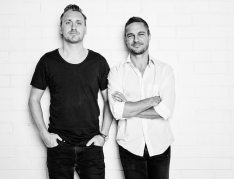Q&A: Rob Lowe and Matt Holmes on their more ‘human’ PR agency Poem
Two months after officially leaving roles at large agencies to launch the more “human” PR agency Poem, founders Rob Lowe and Matt Holmes sat down with Mumbrella’s Miranda Ward to discuss the agency’s future and the state of the PR industry.
What are the challenges involved in launching an agency?
Lowe: The biggest difficulty for us was deciding to do it. It’s having the balls to get out and go out by yourself, there’s not many independent agencies out there. And if there are they tend to be more specialist in terms of fashion or beauty, those kind of more niche areas. We’re much more of a general consumer PR agency and other than Edelman there aren’t that many out there that aren’t attached to a bigger Omnicom/Havas/Publicis type group.



Congrats guys on having a go. Please be careful with your claims. You aren’t the only ones out there pushing the independent consumer PR barrow. There are at least 5 others just in Sydney alone. All of those agencies are run by PR professionals with as much or more experience than you both and all get involved in client work.
You need to find more to differentiate your offering before your Poem client testimonials do the talking in pitches. If you don’t, clients will quickly equate ’boutique’ with ‘cheap’ and your margin drys up. Welcome to the highly competitive neighbourhood.
After reading this on a bus full humans on a commute surrounded by a traffic jam full of humans enclosed by machines, I arrived at my workplace where I greeted and was greeted by humans. I phoned a few humans, responded to the emails that – as far as I could tell – were sent to me by humans. All the time I was thinking, about how we could be more human and, indeed, whether a PR company claiming to be more human would be good. Then I realised I was wasting my time and that of other humans whom I should have been doing human things with. And those very human defences, cynicism and scepticism, caused me to shake my human head at this article.
I wish Rob and Matt all the best and hope that they do a good job of balancing financial necessity and relationship building, but I’d only take the slightest bit of notice of POEM being “more human” if some humans other than the founders and an, on the face of it, credulous journalist told me that dealing with the agency was a more human experience as a bonus to the ROI said humans generated.
And, please, I am no grammarian, and I’ll be hoist with my own petard as soon as we see the typos in this comment … please use the occasional comma or similar in your headlines so we don’t have to read them twice to see what you mean.
Gents, congrats on the new agency – wishing you luck. It’ll be the ride of your life.
Well done guys. And good luck on the new venture.
Can’t believe the first 2 people who commented actually took the time out of their lives to write such negative, condescending drivel. Bit pathetic really.
@jimmy, you are absolutely right. I can’t believe I wrote that rambling crap either. I apologise that it was condensing. My “reason” … not excuse … was mild annoyance at the lack of, well, the lack of very much at all really, in the article. Other than letting us know that some talented guys have started a new agency and say they want it to be more, well, human. Once more, I wish Rob, Matt and their clients every success. And I apologise to Miranda Ward, too. Note to self: get a life.